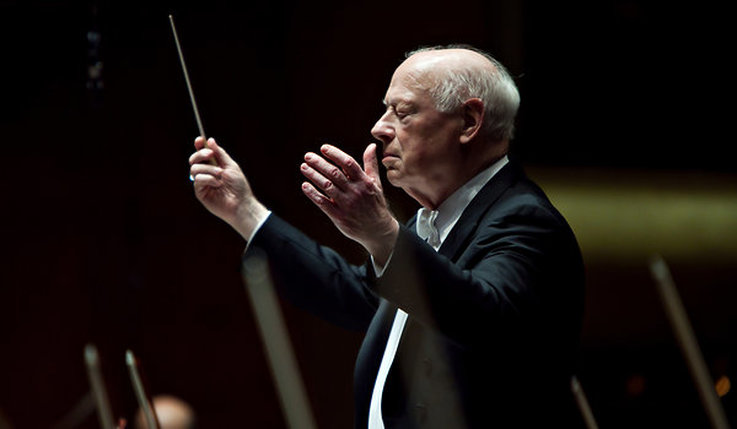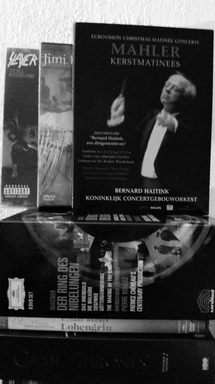|
It's just a few days away from his 87th birthday on March 4th but by the way you see and hear Bernard Haitink conduct you don't wonder if there will be a next time. Cristal clear and full of energy he answers that question with an absolute yes and with the grandeur and authority of an old and seasoned man he sweeps the floor with anyone who might suggest that he is far past his prime. In a way he is past his prime. Time is an one-way street. He'll never be young again and as a consequence he picks his concerts more selectively now. Next year he will, Wotan's willing, be back to conduct Bruckner's 7th with the Royal Concertgebouw Orchestra. An event that, for many in the Concertgebouw audience, can't come soon enough. With 86 year, Haitink is still the prodigal son who steps into a warm bath every time he comes to pay the venue a visit, whether it is with the Chamber Orchestra of Europe or with the Netherlands Radio Philharmonic Orchestra (where he started his career). With a career running for more than 60 years he has a massive discography under his belt. In that discography there's a Mahler cycle that, due to his marred relationship with the then-administration of the Concertgebouw, is denied of its Sixth symphony. These Christmas Matinees of Mahler's symphonic output are genre transgressing events. They've found their rightful place on my DVD-shelves between the Boulez-Chéreau Ring from Bayreuth, Jimi Hendrix live at Woodstock and Slayer's Still Reigning. On Saturday the 27th of February Bernard Haitink was back in the Concertgebouw with Bruckner's 9th and the Netherlands Radio Philharmonic Orchestra. A symphony he already recorded fifty years ago. It's Bruckner's last one and the one that's short of a final. And it is due to Haitink's strong narrative that he makes us hear that the finale of this unfinished symphony is missing. Like a story with no ending. A great performance is a two edged sword. There is the feeling of gratitude (for being there) and of regret (that it comes to an untimely end). It was an impressive trip through the mind of the ever self doubting man that Anton Bruckner was. A journey that made clear that the finale perhaps better is left to it. And not, as Bruckner himself suggested, after he became aware that he wouldn't be able to finish this symphony, to play his (stylistic different) Te Deum as 4th and last movement. Te Deum was played as opening, seperated by an intermission from the 9th, and a grand opening it was. It's a massive piece for choir, orchestra and four solo singers in which the Groot Omroepkoor and the Vlaams Radio Koor took care of the largest part of the decibels that were delivered from the stage. The volume, however, was perfectly mastered during this composition of faith. It's in the better performances of a Bruckner symphony that the music is lifted above its obvious associations with mighty landscapes (think Caspar David Friedrich) and the exalted thoughts of a raptured mind. It's music as an experience (spiritual or religious if you want) in which layers are excavated that reveal the brightest of ones feelings. The sublime that hesitate to come out because it's so aware of its vulnerability. An experience that completely silenced the audience in the Concertgebouw, notorious for its coughing. This silence, imposed by music and not by protocol, is as big a compliment for conductor and orchestra as I can think of. Silence imposed by music, and not by protocol, is one of the biggest compliments for musicians I can think of Haitink's reading was evenly in proportion, both in tempi and in volume. No tutti, the zenith of a crescendo in which all instruments play simultaneously, reached the fray ends of the eardrums. It's the super acoustic of the Concertgebouw that confront many orchestras who play here with problems they sometimes have a hard time dealing with. Then it results in moments in which expression is sacrificed (or mistaken) for volume (it also happens to Markus Stenz and Marc Albrecht who play this venue frequently). It did not happen with the Netherlands Radio Philharmonic Orchestra with Bernard Haitink at the helm. His tempi may have slowed down over the years, his sense for the architecture of Bruckner's cathedrals of sound is still superb, world class and not with too much competition. In this shape it wouldn't be anything but normal that Bernard Haitink will not only visit us next year but also in the decade to come.
0 Comments
Leave a Reply. |
TIMELINE
July 2024
|




 RSS Feed
RSS Feed